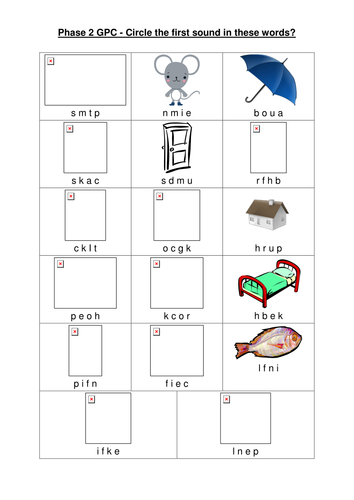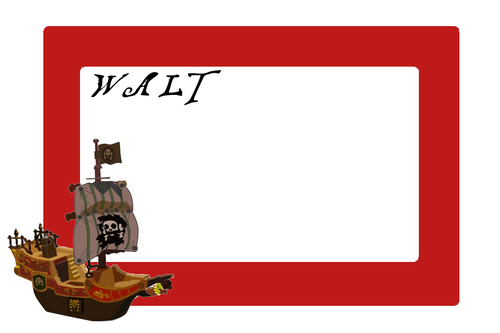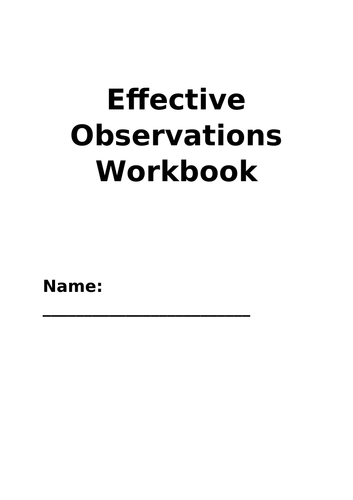
80Uploads
1234k+Views
866k+Downloads
Whole school

Worksheet to test GPC for Phase 2
This is a worksheet that asks children to look at a picture and then circle the first letter of what the picture is. All of the pictures are carefully chosen so that the children will know what it is, no point using a cockatiel! The letters on this sheet are chosen o meet Phase 2 of the Letters and Sounds phonics programme.

Pirate WALT/Learning Objective Image
I did a maths lesson based around a pirate theme and created this Pirate themed WALT image that you can add into any powerpoint presentation, smart notebook etc. and add a text box over it with your WALT/Learning Objective to show children what it is they’ll be covering that lesson. It could even be printed, laminated and written on using a whiteboard pen and changed for each lesson. If anyone wants it so that it says Learning Objective rather than WALT, just let me know.

EYFS Continuous Provision Enhancements Plan/Map
A simple planning map for enhancements within Continuous Provision in a Early Years classroom. Includes a pdf version ready to print and an editable word file to allow you to change the areas to suit your classroom.
A simple map that clearly shows the planned enhancements for the week, which you can also include the intended learning outcome/DM statement in. Simple but effective.

Early Years/EYFS Planning Templates
A couple of different planning formats for planning for weekly topics in the Early Years. Personally, I complete one of these each for Literacy and Maths, sometimes Topic if we’re having a heavy topic week.
Includes the planning of intended learning outcomes/statements, resources, continuous provision area enhancements etc.
A separate format includes more detail if you do split inputs with the use of a TA.
A pretty comprehensive yet simple plan that allows you and all staff within the classroom to know what’s going on that week in the main areas of learning, as well as in provision.

Writing effective observations - staff training presentation and workbook
A training session designed and delivered in a PVI nursery setting, although it applies in any EYFS setting.
The powerpoint takes staff through:
What is an observation
Why we do observations and why they’re important, linked to and explained through the Framework
Comparison of different observations of the same moment to evaluate quality
Effective observations by documenting context, adult interaction, child response, adult response and next step - detailed explanation with examples of how to include these where appropriate
There are then a few slides to set out the expectations of planning and observations in your
This training session would take approximately 30 minutes.

Whole Setting Improvement Plan Template - Linked to Ofsted judgement areas
A highly detailed improvement plan template that is designed to be an ongoing working document that allows you to fully document not only your identified areas of improvement but also improvements that you have made.
The document is broken down into the four Early Years areas from Ofsted: Effectiveness of Leadership and Management, Quality of Teaching, Learning and Assessment, Personal Development, Behaviour and Welfare and Outcomes for Children.
Each area is then broken down into priorities, which are then split into smaller, more bite-sized targets that will allow you to meet that priority and improve that focus area.
Each target gives you the opportunity to be highly detailed in who will meet that target, by when and how and also gives opportunity for evaluation.
It is a working document that is colour coded to show progression over time in each area.
It also has two additional sections to help plan and demonstrate management: a Continuous Professional Development Plan where you can detail the plans for different levels of staff and also parents and then keep a record of CPD and also a schedule for the year for various tasks such as supervisions, appraisals, parent, child and staff voice gathering, parents evenings, parent workshops etc. to help plan these so that they happen in a manageable way.
This document has been through Ofsted inspection where it was highly praised.
I have left a number of early workings on the document to give suggestions for priorities, targets and the other boxes that are there to support the improvement plan but these can be removed or adapted with ease.

Absence Management Policy and Procedure
This is a complete policy and procedure for absence management that follows all UK legislation and guidelines. Basically everything that you need for effective management of absence within any educational setting, fully compliant with legislation and produced in line with HR advice.
Research suggests that effective management of sickness absence can reduce absence levels, benefiting you and your employees, and that’s the basis of this policy and procedure. It’s aim is to be supportive and understanding the staff, whilst supporting manager to be firm when dealing with repeated absence and, potentially, less genuine reasons for absence.
The policy covers:
Definitions of different types of absence
Notification of absence - intermittent absence, long term absence, unauthorised absence
Planned absence
Absence certification (self certification and medical certificates)
Return to work interviews
The three phase procedure for intermittent absences (explanation of the requirements for notification, how to conduct the meetings, their purpose etc)
The three phase procedure for long term sick leave
Accessing medical information
The appeals process
Payments during absence - statutory sick pay, company sick pay, unpaid absence
Rules for employees within their probationary period
It then has:
Return to work interview form
Self certification sickness form








